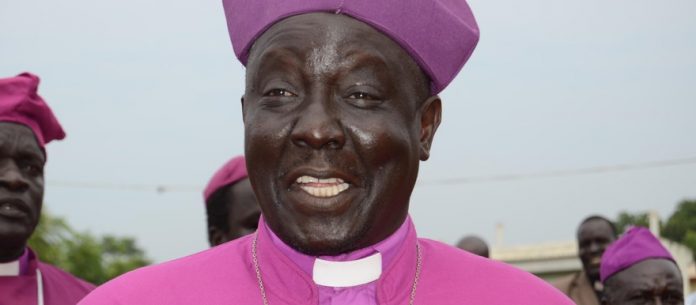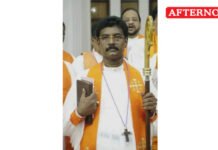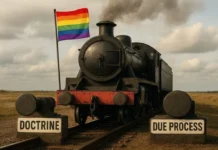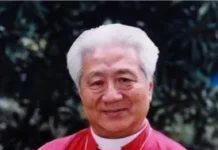Renewed fighting between the Republic of Sudan’s army, called the South Sudan People’s Defense Forces (SSPDF), and the militant group National Salvation Front (NAS) has claimed dozens of civilians’ lives, including that of an Anglican priest last week.
The recent conflict has displaced thousands of civilians from their homes in the defunct Yei River State amid the country’s ongoing battle with the coronavirus.
The Feb. 22 formation of a coalition government between South Sudanese President Salva Kiir and rebel leader Riek Machar was supposed to end the civil war that began in 2013, but experts never had high hopes for this peace deal, saying it is too similar to other deals that have failed.
Since March, the spread of the coronavirus to South Sudan has added even more burden to the country’s ailing economy, sinking infrastructure and food insecurity.
In an interview with Religion Unplugged, the Most Rev. Archbishop of the Central Equatoria Internal Province, Paul Yugusuk, said in June the warring parties tortured civilians, looted property and abducted two ordained priests of the Episcopal Church of South Sudan, part of the Anglican communion. One has been released, and one is still held captive.
Another priest, Theophilus Abugo Dalima, and a church member, Joel Milla Oliver, were killed, and one family of four remains missing as of last week.
“You know, we are the victims,” Yugusuk said. “Those are two giants [the government and NAS forces] fighting, and eventually, the anger is released on the civilians and the church. So, I am speaking on behalf of the people. I am not supporting the NAS rebels [or] the government forces.”
The spokesperson of the National Salvation Front, Suba Samuel Manase, said he had not received any information regarding the arrest of clergy by NAS forces in Lainya County, who are under the command of General Thomas Cirilo Swaka.
“We have our forces operating in that area, but I haven’t gotten any information regarding the arrest of the Anglican priest in Lainya,” Manase said.
The National Ministry of Health on June 11 confirmed 72 new cases of COVID-19 infections, bringing the total number of confirmed cases to 1,670, with many deaths unrecorded.
Yugusuk said the church compound is being overwhelmed by the displaced persons seeking refuge as the violence escalates.
“Life is very difficult,” he said. “There is no way to tell the displaced persons to keep social distancing or use masks. There are no face masks, washing containers and sanitizers. Their houses were burned down and property looted — if they go back now, there is no food. They can’t go back home. They have to remain in the displaced camps. Of course, we would continue to create awareness about coronavirus and solicit for humanitarian assistance.”
South Sudan is a landlocked country bordering Sudan, Ethiopia, Kenya, Uganda, the Democratic Republic of the Congo and the Central African Republic, several of which have confirmed rapidly rising numbers of COVID-19 cases in the past week.
“We were first affected by COVID-19 and now there is armed conflict,” Yugusuk said.
In addition to providing medical care, the church is providing counseling services. Many of the displaced persons have been tortured and beaten.
The Sant’Egidio community, a Catholic association, mediated a peace process Jan. 13, called the Rome Declaration, between the government of South Sudan and the South Sudan Opposition Movements Alliance (SSOMA), which culminated in the signatories’ committal or recommittal to the 2017 Cessation of Hostilities Agreement.
But the Sant’Egidio-mediated peace process between South Sudan’s warring parties came to a halt as the Rome-based association battled the coronavirus pandemic in Italy.
SSOMA is a coalition of six armed opposition groups that rejected the IGAD-mediated revitalized peace agreement signed in 2018 in the Ethiopian capital, Addis Ababa, saying the deal fell short of addressing the root causes of the conflict in the world’s youngest country. IGAD, or Intergovernmental Authority on Development, is a trade bloc of eight African countries.
Since 2013, South Sudan’s civil war has caused severe man-made hunger and famine, problems now exacerbated by the COVID-19 pandemic, communal conflicts and child abductions.
Recently, Yugusuk said, SSPDF soldiers killed two members of South Sudan’s Kaliko community at the border between South Sudan and the Democratic Republic of the Congo.
“The Kaliko people were staying in DR Congo, not as refugees,” he said. “They have been given land in DR Congo by the natives to cultivate. While they were staying there, the SSPDF soldiers crossed the border into DR Congo and attacked the Kaliko, killing two people and then looted their property.”
South Sudan’s army spokesperson, Lul Ruai Koang, denied the allegations.
Yugusuk calls on the country’s newly appointed Chief of Defense Forces to discipline and transform the national army to respect the civilians and stick to their constitutional mandate of protecting the country’s territorial integrity. He says he was happy with the visit of the Chief of Defense Forces, General Johnson Juma Okot, to Lainya and Yei.
“We are urging him to organize the army. The army needs to be organized because there are so many commands, and we don’t know who belongs to whom, who reports to whom and who to be approached when there is conflict,” he said.
Regardless of the pledges made by several high-ranking government officials to prioritize the delivery of services to the civil population, the security sector receives about 20 percent of the country’s annual budget allocation, while the social sectors remain gravely underfunded.
Yet the majority of soldiers in the country are food insecure, with their salaries often delayed.
“Our forces are suffering, though the security sector [combined with the public administration sector] is getting 40 percent of the annual fiscal budget,” Yugusuk said. “Despite this, the soldiers are not paid and are not given food. The new Chief of Defense Forces should address this issue. We want to see our soldiers getting money and they are fed well and then they are trained. The soldiers should be trained and professionalized to respect the citizens.”
More than 40 church leaders have been killed in South Sudan from the outbreak of the civil war in 2013 to 2017, and the number is expected to be much higher now. Among those killed are Simon Kwaje, who was a priest at Emmanuel Cathedral when he was brutally attacked by unknown gunmen along the Juba-Mukaya road in March 2017. A Slovak Catholic nun and physician, Veronika Terezia Rackova, was killed in 2016 by government soldiers at a checkpoint in a Yei town while driving an ambulance with an expecting mother, according to reports from Yei.
Most of the priests who have been killed served with South Sudan’s Episcopal Church, while others were from the Evangelical Presbyterian Church and the Catholic Church.
In November 2018, a Kenyan Jesuit priest was also shot and killedby armed men in South Sudan’s Gok State.
As the number of coronavirus cases continue to rise in South Sudan, the defunct Yei River State, which is southwest of the national capital, Juba, remains volatile. Many of the hold-out groups who are not signatories of the 2018 revitalized peace agreement continue to engage in an active military confrontation with the government, displacing thousands of civilians from their homes.




We can pray for them, but also bring this matter to the attention of our political representatives. There may not be much we can do, but international attention can sometimes make a difference.